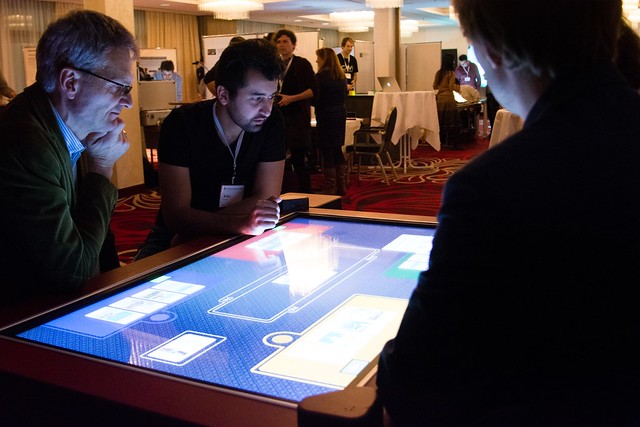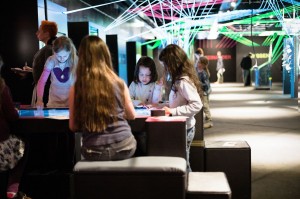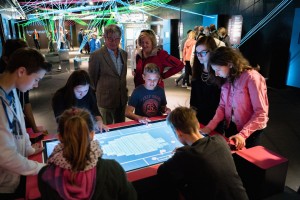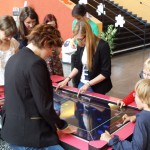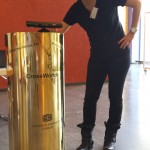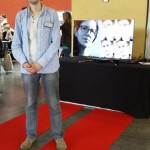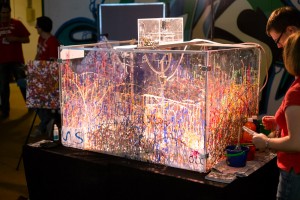From 16th-19th of november the ACM conference for Interactive Tabletops and Surfaces (ITS) took place in Dresden. Besides the lectures the event included a poster & demo session, in which CrossWorlds members Michael Storz and Kalja Kanellopoulos presented their second tabletop ‘comforTable’.
One of the highlights of the conference was Joachim Sauter’s closing keynote. In his inspiring presentation the director of the renowned design agency ART+COM gave insights in their magnificent work with interactive surfaces and showed a number of best practice examples. Concerning the development of new technologies he emphasized: “If you work with technologies you can only predict the future if you work interdisciplinary. People have to be open to leave their fields and work together with others.” Furthermore Sauter stressed the narrative potential of interactive surfaces, linking interaction design to composition and poetry. Putting the importance of briefing and re-briefing during the process of technological development into focus, he pointed out: “All of our ideas are already in our minds. You just have to open the door.”
kalja kanellopoulos
CrossWorlds fellows Michael Storz and Kalja Kanellopoulos contributed an interactive tabletop to the exibition-ship MS Wissenschaft. The ship is touring through Germany and Austria until 28th of september with its exhibition “Digital unterwegs”. A detailed tour plan can be found here.
The tabletop offers two applications, a turn based card game for up to four and a pong game for up to six players. Additionally the tabletop is equipped with a user tracking system which notices when new players approach the table. In front of new players a dialog automatically pops up enabling users to log into the game.
Three teams of the CrossWorlds research group were chosen by the DFG for being advertised on the Terra Digitalis Website, which is now online – check it out!
Please scroll down on the page to make your balloon travel across the Terra Digitalis. Or simply click on these links to get to the CrossWorlds projects immediately:
Anke Tallig & Andreas Bischof
Kalja Kanellopoulos & Michael Storz
Madlen Wuttke & Kai-Uwe Martin
On April 25th and 26th the 10th Studentische Medientage took place at the new auditorium building (NHG) at Technische Universität Chemnitz. In accordance with this year’s theme ‘Get Connected!’ numerous communication professionals discussed the importance of networking in lectures and workshops.
Once again the CrossWorlds team supported the conference by displaying their research projects. Amongst other examples, the second prototype table platform of Kalja Kanellopoulos and Michael Storz, presenting a card game and a game of Pong, was open to public experimentation. Currently, their second table is aboard the ship ‘MS Wissenschaft’ and travels across the rivers of Germany. Furthermore, Michael Heidt preseted a join
t human-computer exploration device and Anke Tallig tested the detection capabilities of non-verbal communication behavior by her new robot-guide installation.
And in addition to the professional audiences, the mentoring program ‘Girl’s Tandem’ visited the symposium and interacted with the various exhibitions from CrossWorlds.
The ‘Studentischen Medientage‘ are developed and organized solely by students of the Institute for Media Research at the Technische Universität Chemnitz but nevertheless established itself as a networking platform for other students and media professionals across Germany. This annual conference, established in 2005, meanwhile attracts more than 500 visitors from science and practice, in order to discuss media-relevant developments, new media perspectives and ideas.
On 12th of february CrossWorlds was visited by Prof. Dr. Harald Reiterer professor for Human Computer Interaction at University of Konstanz. His talk “Die reale Welt als Vorbild – Neue Wege der Interaktion mit digitalen Welten”(Taking the real world as an example – New ways of interaction in digital worlds) gave us inspiring insights into several projects of his workgroup. His research focus on interactive systems and tabletops ties on our own efforts in this direction. After the talk our fellow researchers Michael Storz and Kalja Kanellopoulos had the opportunity to demonstrate their own developed tabletop and its applications. Especially our design for an “in the wild”-setting of the tabletop, which was and will be tested and evaluated in museum situations, appealed to our guest.
His talk was recorded and edited by the television studio of the professorship Media Informatics.
This years edition of Germany’s primary conference on human computer interaction “Mensch und Computer” took place in bremen with high involvement of CrossWorlds’ researchers. Since the conference character emphasizes interdisciplinary exchange between academics, practioners, computer scientists, UX designers and social sientists several of our research fellows participated actively in the event.
Andreas Bischof and Benny Liebold organized a workshop on methodological approaches to HCI, where Kalja Kanellopoulos and Michael Storz presented their multitouch table for multiple users (Kanellopoulos, Storz 2013, in press). A very interesting discussion about the outlines of a possible mutual methodology for both computer scientists and designers / social scientists was initiated by Michael Heidt‘s talk (Heidt 2013, in press). The main talking points can be understood in two (german-language) blog posts. One is pointing out the question, how qualitative data and results can be communicated more compatible for HCI projects, the other sums up a discussion on interdisciplinary communication around code between computer scientists. A literally visionary (and entertaining) submission from TU Chemnitz researchers beyond that was the visual computing group‘s video on a possible HCI avatar tool in the shape of cuddly toys.Our fellow researcher Kalja Kanellopoulos was invited to take part in an interdisciplinary PhD workshop with Prof. Lucy Suchman at the Ruhr University Bochum last week. Suchman is an expert in anthropology and sociology, focusing on science and technology studies, feminist technoscience and human-computer interaction – to name only some of her main research areas. Before coming to the Lancaster University Department of Sociology and Centre for Science Studies she spent twenty years as a researcher at Xerox’s Palo Alto Research Center. Her book Human-Machine Reconfigurations. Plans and situated actions (embedded at the end of the article), first published in 1987 as her thesis, broadly influenced different scientific fields and still counts as one of the key texts in science and technology studies and human-computer interaction. The 12 participants of the workshop were invited to discuss their projects with Suchman, applying the concepts she developed to their own work. The inspiring one day workshop brought together young academics from different scientific fields, such as sociology, anthropology and media studies. It was organized by the Mercator Research Group.
